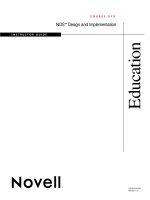Tài liệu Graphic Design pot
Bạn đang xem bản rút gọn của tài liệu. Xem và tải ngay bản đầy đủ của tài liệu tại đây (772.76 KB, 6 trang )
The Study of Graphic Design
Graphic design is a professional field of
study based on the foundations of visual
communication. The study of graphic design
encompasses cultural, aesthetic, ergonomic,
technical, ethical and economic fields. Design-
ers create communications that serve many
needs—everything from brand identity to
multimedia interfaces. They solve communi-
cation problems of all types and sizes. The
solutions require creativity, lateral thinking,
research, and excellent verbal and written
communication skills.
Graphic design has its roots in a variety of
sources, including the study and history of the
fine arts as well as the knowledge of tech-
nology and its history. The history of graphic
design is linked to commerce and the ability
of merchants, institutions and governments
to communicate with their fellow citizens.
It is also related to philosophical, literary
and artistic movements.
Undergraduate Information
Graphic Design
Find us online at
www.design.iastate.edu/
GD/index.php
College of Design
Typography study, ArtGR 270
A. Platt, e-commerce Web site, ArtGR 478
The Degree
e bachelor of fine arts (BFA) in graphic design is a four-
year degree focused on preparing students for a career in the
visual communication profession. is preparation includes
an internship, international experiences, field trips, active
involvement in professional organizations, and a well-
balanced curriculum.
e graphic design program also offers a master of fine arts
(MFA) in graphic design. e graduate degree is designed
primarily for those interested in an advanced position in the
design industry or in higher education.
How can graphic design improve the functionality and
appearance of Internet communications?
Graphic Design at Iowa State University
In the 1960s, Iowa State University offered its first program in
graphic design, called advertising design, through the College
of Home Economics. By the time the College of Design was
formed in 1978, the number of students enrolled in advertising
design had grown to more than 300. In 1981 the name of the
program changed to graphic design to reflect a more focused
professional program.
Graphic design is a part of the department of art and design,
which, together with the departments of architecture, landscape
architecture, and community and regional planning, forms a
unique and innovative interdisciplinary environment.
Typography study, ArtGR 370
The Curriculum
e undergraduate program in graphic design is a four-year
course of study. During the first year, students complete the
College of Design’s Core Design Program, which includes
courses in design, drawing, and cultural studies as well as
general education requirements such as math, science, English
composition, an introduction to the university library, and
electives. At the end of the first year, students are evaluated
by the faculty on the basis of a portfolio review, essay, and
academic achievement. Successful candidates then enter the
curriculum in graphic design.
e graphic design curriculum consists of a three-year stu-
dio sequence that is supplemented with technology options,
additional studio options, and professional practice courses
and experiences. Students are encouraged to explore creative
problem-solving techniques through their studio classes. ey
work together in teams and individually to solve the communi-
cation problems posed by their course assignments. Iowa State
is one of only a few design schools that offer a two-semester
sequence of graphic design history courses.
Many students elect to enroll in a minor to broaden their
educational experience at Iowa State. Minors chosen by graphic
design majors have included computer science, English, adver-
tising, business, and modern languages.
Demand for Graduates
Iowa State’s undergraduate program in graphic design is
one of the strongest in the United States. Iowa State alumni
are employed in some of the best design studios, corpora-
tions and advertising agencies throughout the country.
ey are consistently represented in the most prestigious
design exhibitions in the world, including the American
Center for Design 100 show, the AIGA Communication
Graphics exhibit, and Industrial Design’s annual exhibit,
and their work may be found in many major national and
international design publications.
Demand for graphic design graduates is high in several
areas, including Web design and time-based media, publi-
cation design, and multidisciplinary design with a focus on
collaboration. Iowa State alumni frequently work in Iowa
and the surrounding states, as well as many major cities in
the United States and around the world.
How can we communicate complex
information to large audiences?
How can we visually communicate information through
diagrams, illustrations and photographs?
How can graphic design influence the
economic and business environments
of the future?
N. Noonan, publication design, ArtGR 491 Erin Fitzgerald, exhibit design, ArtGR 474
Abigail Luhrs, patterns generated by repeating and rotating a six sided cube 16 times.
Each face of the cube has a different but harmonious design. ArtGR 270
HaeInn Lee, food label project
Carl Hoofnagle, exhibit structure,
ArtGR 474
The Faculty
e graphic design program has seven full-time faculty, and
practicing professionals are invited as guest lecturers and review-
ers to add richness and diversity to the curriculum. Faculty
members have varied backgrounds, and all have professional
experience in design practice before coming to education.
Many have unique specializations that range from green design
practices to human-computer interface design.
Opportunities and Resources
Many graphic design students participate in the university
honors program, which offers seminars, special programs and
projects for undergraduates who have demonstrated the ability
and motivation to assume more than the usual responsibility for
their education. Iowa State also has an active student chapter of
the American Institute of Graphic Arts (AIGA), the professional
organization for graphic design. Off-campus opportunities in-
clude international study programs such as the semester abroad
in the College of Design’s Rome facility.
Graphic design studios are equipped with wireless network
technology that enables students to connect to the university
and college networks from their studio desks. Students are
strongly encouraged to own laptops and bring them to class for
maximum productive use of their time. e College of Design
provides assistance and advice on which computer and software
are needed for each design discipline; if you are considering a
major in graphic design, please consult with the college’s laptop
program coordinator prior to purchasing a machine. Peripherals
and output devices are contained in the college’s computer labs.
If these questions interest you,
consider a major in graphic design.
Craig Oldakowski, package design, ArtGR 471
Kim Ahrens, animation project, ArtGR 473
HaeInn Lee, food label project
Austin Van Laar, process book,
identity design, ArtGR 470
Lisa Ly, publication design, ArtGR 491
Marnie Meylor,
information design,
ArtGR 370
Printed postcard designs, ArtGR 372
How to Give an Insulin Injection
© 2007 Iowa State University
Photographs by Roger Baer, Robert Elbert, Michael Faas
Iowa State University does not discriminate on the basis of race, color, age,
religion, national origin, sexual orientation, gender identity, sex, marital status,
disability, or status as a US veteran. Inquiries may be directed to the Director
of Equal Opportunity and Diversity, 3680 Beardshear Hall, Ames, IA
50011-2024, (515) 294-7612.
Journals from graphic design students in Rome
Contact Us
For more information on how you can become involved in
the study of graphic design at Iowa State University, contact
the department or the Office of Admissions:
Iowa State University
Department of Art and Design
Graphic Design Program
158 College of Design
Ames, IA 50011-3092
(515) 294-6724
www.design.iastate.edu/GD/index.php
Iowa State University
Office of Admissions
Alumni Hall
Ames, IA 50011-2010
(800) 262-3810
www.admissions.iastate.edu
Financial Assistance
e university offers financial assistance in the form of grants,
scholarships, loans and part-time employment. Scholarship
recipients are selected on the basis of academic merit or other
demonstrated talent as well as financial need. For new students,
two scholarships are available. One is awarded through the
College of Design to students entering a design-related major,
while the department of art and design offers a scholarship for
new students who have chosen a major in the department (like
graphic design). A merit scholarship is available for graphic
design students at the sophomore and junior levels. e depart-
ment also presents a number of awards and scholarships to cur-
rently enrolled students on the basis of academic achievement.
High School Preparation
Beyond the minimum requirements for admission to Iowa
State University, students who plan to pursue a major in
graphic design may find a background in art, photography,
journalism or computer science helpful in preparing for
college coursework.
Rome studio
Rome studio
Field trip









